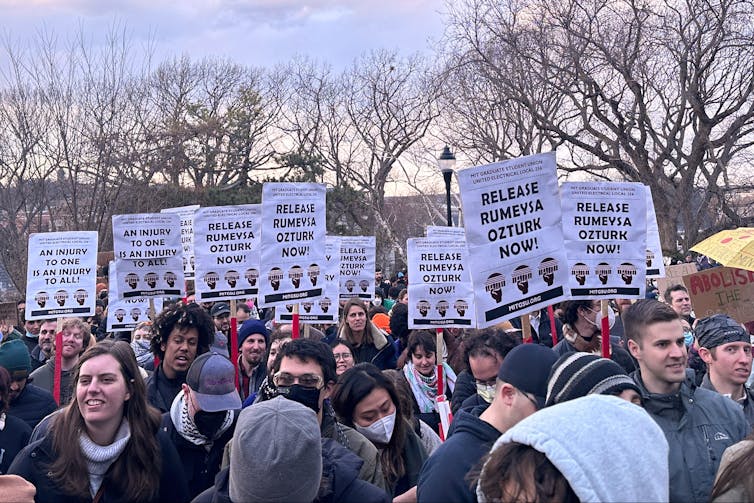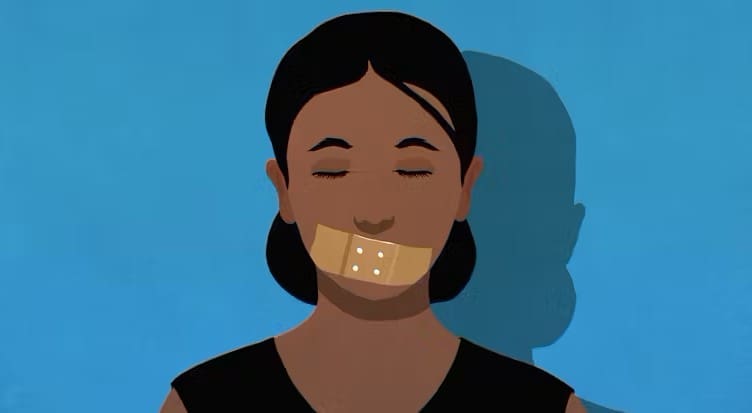Harvard University took the extraordinary step of suing the Trump administration on April 21, 2025, claiming that the pressure campaign mounted on the school by the president and his Cabinet to force viewpoint diversity on campus violated the Constitution’s guarantees of free speech.
“Defendants’ actions are unlawful,” Harvard’s lawsuit states. “The First Amendment does not permit the Government to ‘interfere with private actors’ speech to advance its own vision of ideological balance.’”
Yet in his first term, President Donald J. Trump declared that free speech mattered.
Trump issued the “Executive Order Restoring Free Speech and Ending Federal Censorship” on March 21, 2019. In it, he expressed the importance of free inquiry and open debate to education and directed federal officials to use the federal government’s funding of higher education to ensure that universities promote free inquiry.
Channeling free-speech champions Benjamin Franklin and James Madison, Trump wrote that “free inquiry is an essential feature of our Nation’s democracy.”
As a professor of constitutional, criminal and comparative law, and as a citizen who enjoys his liberty, I agree.
Free speech is fundamental to human progress. Scientific, medical, technological and social advancements all rely on the free flow of information. Robust discussion and disagreement are equally important to maintaining a healthy constitutional republic.
In the words of the late U.S. Supreme Court Justice Robert Jackson, “If there is any fixed star in our constitutional constellation, it is that no official, high or petty, can prescribe what shall be orthodox in politics, nationalism, religion, or other matters of opinion or force citizens to confess by word or act their faith therein.”
The First Amendment’s free speech and press clauses protect all forms of expression – oral, print, digital and artistic – from governmental interference or punishment.
Of the many types of speech, political speech is the most protected.
On the first day of his second term in office, Trump issued another free speech executive order. It affirms the administration’s commitment to free speech, directs that tax money is not used to abridge free speech and instructs federal employees to “identify and take appropriate action to correct past misconduct by the Federal Government related to censorship of protected speech.”
In a vacuum, Trump’s orders appear to bode well for free speech.
But what is important is free speech reality, not rhetoric. Three months into his second term, where does Trump stand?
The many interconnected orders, letters, statements and actions of Trump’s White House make an assessment of any positive effects difficult. On the other hand, the Trump administration has clearly violated and chilled free speech on many occasions.
Repression and retaliation
Attempts to silence the president’s adversaries are developing as a pattern.
Law firms and attorneys who have sued or prosecuted Trump, or represented his adversaries, have been targeted for retribution and concessions. It began with an executive order on March 6, 2025, directed at the U.S.-based global law firm Perkins Coie, which had once represented Trump’s opponent in the 2016 presidential race, Hillary Clinton. A second order was issued on March 14, 2025, against Paul, Weiss, Rifkind, Wharton & Garrison because it once employed an attorney who investigated Trump. Subsequently, at least six other prominent law firms were also targeted.
Several law firms acceded to the president’s demands, agreeing to accept clients without regard to political beliefs, to eliminate DEI practices, and to perform pro bono work valued in the hundreds of millions of dollars for causes Trump supports.
The firms that didn’t accede to the president’s demands had their security clearances removed, access to federal buildings restricted, and were banned from working for federal agencies. A few of the firms that didn’t relent have won temporary injunctions barring the administration’s actions against them.
The nonpartisan free speech advocacy organization Foundation for Individual Rights and Expression decried the orders as threatening the foundations of justice and free speech. In one of several challenges to these orders, U.S. District Judge Beryl Howell wrote on March 12, 2025, that Trump’s order appeared motivated by “retaliatory animus” and concluded that it “runs head on into the wall of First Amendment protections.” Two other federal courts reached similar conclusions.
In the first three months of his second term, Trump withdrew Secret Service protection of several prominent critics who are former federal government officials, including John Bolton, a former Trump national security adviser. Former Secretary of State Mike Pompeo, his top aide, Brian Hook, and former high-level health official Anthony Fauci also lost their security protection.
It is hard to imagine that these decisions won’t have a profoundly chilling effect on potential critics of the president, especially since the revocations were publicly announced and each individual has been the subject of credible threats resulting from their governmental service.
Targeting the press
A similar pattern exists for journalists, where Trump is using his power to punish organizations whose reporting he doesn’t like.
AP journalists were banned from the White House and Air Force One on Feb. 11, 2025, for refusing to refer to the Gulf of Mexico as the Gulf of America, the new name Trump had ordered for the body of water. On April 9, 2025, this ban was found to violate the First Amendment by a judge nominated by Trump during his first term.
Denouncing CNN and MSNBC as “illegal” and claiming they are paid political operatives, Trump suggested they should be investigated during a speech at the U.S. Department of Justice.
Trump effectively closed Voice of America, after 83 years of continuous broadcasting, for being “anti-Trump” and radical in its views. By charter, the broadcaster represents “America, not any single segment of American society,” with “accurate, objective, and comprehensive” news and “a balanced and comprehensive projection of significant American thought and institutions” through television, radio, internet, social media and satellite broadcasts to peoples around the world.
The Federal Communications Commission has initiated regulatory actions against the licenses of several television stations for broadcasts that have been accused by the President of being anti-Trump or biased in favor of Kamala Harris. Early in the process, the outcomes of these actions are to be determined.

AP Photo/Michael Casey
Pressuring universities and students
Other administration actions, I believe, raise serious free speech issues.
Harvard isn’t the only university feeling pressure.
The administration is threatening to withhold federal money from universities as a way to coerce many of them to comply with administration policies in ways that implicate free speech and in some instances violate legal processes for the withholding of federal support.
Some of the Trump administration’s recent immigration enforcement efforts have targeted international students who are in the U.S. lawfully but who participated in Palestinian rights protests and disagreed with Israel’s actions during the war in Gaza.
The administration claims that some students whose visas have been revoked were either Hamas supporters or violated criminal laws. The administration has also said that many students are being deported under broad authority the secretary of state has to deport those deemed a danger to national security.
Democracy and free speech
In the past decade, the U.S. has fallen in press freedom, rule of law and democratic governance, resulting in the classification of a “flawed democracy” by the Economist Intelligence Unit, a democratic watchdog. Unsurprisingly, there has been a simultaneous rise in public support for authoritarianism. These changes make support for free speech increasingly important.
On March 4, 2025, Trump declared in a speech before a joint session of Congress that he “stopped all government censorship and brought free speech back to America.”
The record doesn’t support this claim.![]()
Daniel Hall, Professor of Justice and Community Studies & Political Science, Miami University
This article is republished from The Conversation under a Creative Commons license. Read the original article.
